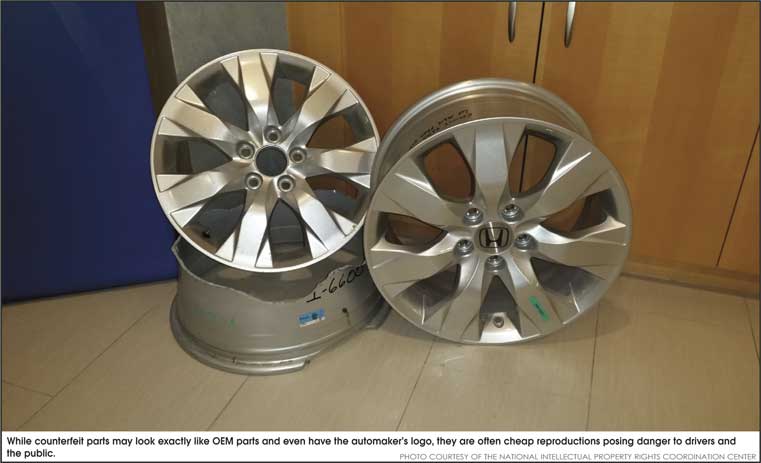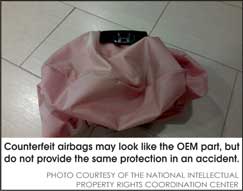
by MIKE BRESLIN
Making an inferior replica of something in order to trick people is a crime. If it’s an inferior counterfeit auto part, it can lead to serious injuries even deaths.
That’s why private industry and the U.S. government are working together and have recently ramped up efforts to combat the growing proliferation of ersatz, dangerous auto parts.
Preventing the spread of counterfeit automotive parts and targeting criminals who engage in that type of activity is now a major priority for the National Intellectual Property Rights Coordination Center (IPR Center). It’s a joint task-force agency led by Homeland Security Investigations, a component of the Immigration and Customs Enforcement (ICE) agency.
Bruce Foucart, director of the IPR Center reported, “There was a key investigation out of Washington in which Homeland Security Investigations caught individuals trafficking in counterfeit airbags from Canada. Counterfeit seatbelts, auto glass and wheels are also a concern. We are working closely with representatives from across the auto industry to prevent the use of dangerous, counterfeit auto parts.”
Unfortunately, the use of illegal counterfeit automotive parts is increasing in the U.S., creating public safety concerns, according to Foucart. These counterfeit parts usually bear the trademark of a legitimate and trusted brand, but they were produced by another party and are not made to the specifications of the original equipment manufacturer. They’re often produced illegally and sold at a profit to fund other criminal activities.
“Law enforcement has identified a trend of counterfeited parts that is growing at an alarming rate,” said Foucart. “At best these parts will not perform as well as authentic parts. At worst, they can fail catastrophically with potentially fatal consequences.
“It’s hard to quantify the number of accidents or deaths caused by counterfeit auto parts. When accidents happen on the road, sometimes you will get an insurance adjuster that will do an investigation, sometimes you’ll get a state trooper to do an investigation, but what they are looking at are the conditions of the road or someone texting, things like that. Rarely are they going to do a deep dive into the innards of the car to see, for example, did the airbags deploy prematurely, or if the brake pads failed to work.”
Foucart pointed out that counterfeit parts often have the automakers logo on them. “The OEM is going to know right away by looking at the product if it’s fake or not. We, as investigators, are not experts on this and why we work hand-in-hand with industry. They have brand protection investigators that are often out in the field with us as we are conducting search warrants, or at the borders doing seizures.
“Starting in 2009 the automobile industry started to come to us for help with the problem. Now we are working with most of the major manufacturers. Their investigators and security people have taken their own initiative and banned together to create a coalition group in which they discuss the problem among themselves as well as share information with us as to what they are seeing, and provide potential investigative leads on counterfeits. I spoke to this roundtable group in Detroit in July and we had a great exchange of information. I give them a lot of credit; they are creating their own internal policies and establishing structure to combat counterfeit parts.”
 Foucart offered that auto parts recyclers can help with this problem. “Auto parts recyclers are pretty sharp and they know their business. Certainly, if they recognize that a part seems out of place, or doesn’t seem right, we have several methods where they can “drop-a-dime” so to speak and provide information to us on our website, www.iprcenter.gov.
Foucart offered that auto parts recyclers can help with this problem. “Auto parts recyclers are pretty sharp and they know their business. Certainly, if they recognize that a part seems out of place, or doesn’t seem right, we have several methods where they can “drop-a-dime” so to speak and provide information to us on our website, www.iprcenter.gov.
There we have a big, yellow ‘button” where the industry or general public can click the button and provide information about counterfeit auto parts. They can do it anonymously or put down their contact information. Or, they can report the crime to the HSI Tip Line, toll-free at (866) 347-2423. That information goes to our specialists who vet the information and create an intelligence product. That product will either be forwarded to our field investigators, or it may be sent to the auto industry. Our job at the IPR Center is to ensure the right information gets to the right agents in the field for them to investigate.”
Some of the most dangerous counterfeit products involve airbags that can literally explode in the victim’s face during an accident.
Some other counterfeit parts seized by law enforcement include: seat belts, oil and air filters, brake pads, brake rotors, control arms, windshields, bearings, steering linkages, ignition coils, microchips, spark plugs, wheels, solenoids, clutch housing, crankshafts, diagnostic equipment, suspension parts and oil pumps.
Foucart warned that it’s imperative that the public, as well as the industry, protect themselves from the possible safety hazards of these parts. He suggested the following:
•Do business only with reputable repair shops, the manufacturer’s dealership repair network, or legitimate automotive recyclers selling used OEM parts.
•Stay informed about the sources of parts you are purchasing or are installing.
•Beware of too-good-to-be-true prices that are well below those of competitors.
•Use caution when purchasing auto parts on the Internet that are shipped from other countries or are sold at very low prices.
If you suspect you have inadvertently purchased counterfeit parts, consult an original equipment manufacturer representative or a reputable mechanic for identification and replacement.
The Automotive Recyclers Association (ARA) has also become proactive in warning consumers and the automotive industry about the growing danger of counterfeit automotive parts and is urging consumers to use recycled OEM parts supplied by professional automotive recyclers. ARA represents the interests of over 4,500 U.S. auto recycling facilities and fourteen other countries.
“The issue of counterfeit parts has become a serious concern for the professional automotive recycling industry because like the auto manufacturers, ARA members also sell genuine, OEM parts,” said Michael E. Wilson chief executive officer of ARA. “Each day over 500,000 recycled OEM parts that were designed and built to meet the automakers original requirements for fit, finish, durability and safety are sold directly to consumers as well as to repairs shops. The presence of counterfeit parts in the marketplace is harmful to automotive recyclers and all other reputable part suppliers.”
In 1997, ARA established its Gold Seal Certification Program that defines standards for recycled parts quality assurance, parts descriptions and other facets of quality control. This program is recognized by the Automotive Service Association and other industry partners.
Wilson said that many professional automotive recycling facilities employ multi-step quality control precautions. The industry has become increasingly sophisticated in methods of processing, inspecting, evaluating and analyzing OEM parts harvested from salvage vehicles. For example, at a typical professional automotive recycling facility, these processes may include a review of the vehicle’s build codes, capturing images of the vehicle and its component parts to track the vehicle part record, verification of interior colors, conditions and option lines (seats, dash board, door parts), assessing the extent and type of any damage, and checking the vehicle identification number.
Wilson also noted that additional inspection of parts or assemblies may take place after the disassembly process has taken place. These practices described are industry practices of well run professional automotive recycling businesses. As a result of these quality control processes, parts found to be of a substandard condition grade, rusted, non-repairable or otherwise suspect, such as possible counterfeit parts, are not listed as available on estimates or sold to customers.
Lawmakers across the country are increasingly aware of the threats posed by counterfeit automotive parts and are taking steps to address the problem. Legislation has been passed in several states making it a crime to knowingly manufacture, import, install, reinstall or sell a counterfeit or nonfunctional airbag. “ARA has been able to reach out to other interested parties, such as the Association of Global Automakers, to address the specific issue of counterfeit airbags,” said. Wilson. “In March of last year, as a result of ARA’s interaction with the National Highway Traffic Safety Administration (NHTSA) on counterfeit airbags issues, ARA met with senior policy staff from the Obama Administration responsible for coordinating the federal government’s efforts on intellectual property (IP) enforcement issues. Also in attendance was a representative of the U.S. Immigration and Customs Enforcement division of the Department of Homeland Security and a representative of the FBI.”
“The problems of counterfeit airbags have been getting an increasing amount of publicity in the past few years,” says Jessica Andrews, ARA’s director of state government and grassroots affairs. “In 2013, Connecticut was the first state to actually introduce and pass legislation aimed at making it a crime to sell, install, manufacture, import or reinstall a counterfeit airbag or any device that causes a vehicle’s onboard diagnostic system to inaccurately indicate that the vehicle is equipped with a functional airbag.”
Andrews reported that in early 2013 ARA began working with other stakeholders, led by American Honda and other global automakers, to introduce legislation in other states targeting counterfeit and non-functional airbags. Since that time several additional states have passed laws aimed at counterfeit and non-functional airbags and the number of states introducing the language has grown each year. A number of states have passed bills including Maryland, Ohio, Iowa, New Mexico, New York, Alabama and Florida. Pennsylvania lawmakers recently took up the issue when a bill was introduced in July.
ARA believes collision repairers should use their professional training and judgment to make repair decisions based on the individual circumstances surrounding the damaged vehicles, and that all stakeholders involved in the collision repair marketplace should recognize the genuine value, safety and benefits that each repair part option (recycled, new, aftermarket, remanufactured) may provide in a given repair. ARA urges consumers and repairers to be informed about the source of parts being purchased or installed in a vehicle. Professional automotive recycling operations have robust product assurance and quality control procedures in place to identify parts that do not meet industry accepted standards. If a counterfeit part is suspected, ARA suggests reporting the incident to HSI, the IPR Center or an FBI field office.
Published in the October 2015 Edition of American Recycler News







